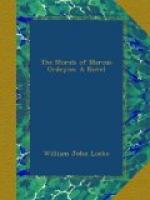“Ch, lots,” she said in her frank way. “I am very beautiful.”
I picked up the parasol, bowed apologetically to the owner of the stricken animal, and addressed Carlotta.
“Listen, my good child. You are passably good-looking, but you are by no means very beautiful. If I tried to sell you here, you might possibly fetch half a crown—”
“Two shillings and sixpence?” asked the literal Carlotta.
“Yes. Just that. But as a matter of fact, no one would buy you. This is not the marriage market. There is no such thing as a marriage market. English mothers and fathers do not sell their daughters for money. Such a thing is monstrous and impossible.”
“Then it was all lies I read in the book?”
“All lies,” said I.
I hope the genial shade of the great satirist has forgiven me.
“Why do they put lies in books?”
“To accentuate the Truth, so that it shall prevail,” I answered.
This was too hard a nut for Carlotta to crack. She was silent for a moment. She reverted, ruefully, to the intelligible.
“I thought I was beautiful,” she said.
“Who told you so?”
“Pasquale.”
“Pasquale has no sense,” said I. “There are men to whom all women who are not seventy and toothless and rheumy at the eyes are beautiful. Pasquale has said the same to every woman he has met. He is a Lothario and a Don Juan and a Caligula and a Faublas and a Casanova.”
“And he tells lies, too?”
“Millions of them,” said I. “He contracts with their father Beelzebub for a hundred gross a day.”
“Pasquale is very pretty and he makes me laugh and I like him,” said Carlotta.
“I am very sorry to hear it,” said I.
The griffon, who had been sniffing at Carlotta’s skirts, suddenly leaped into her lap. With a swift movement of her hand she swept the poor little creature, as if it had been a noxious insect, yards away.
“Carlotta!” I cried angrily, springing to my feet.
The ladies who owned the beast rushed to their whining pet and looked astonished daggers at Carlotta. When they picked it up, it sat dangling a piteous paw. Carlotta rose, merely scared at my anger. I raised my hat.
“I am more than sorry. I can’t tell you how sorry I am. I hope the little dog is not hurt. My ward, for whom I offer a thousand apologies, is a Mohammedan, to whom all dogs are unclean. Please attribute the accident to religious instinct.”
The younger of the two, who had been examining the paw, looked up with a smile.
“Your ward is forgiven. Punch oughtn’t to jump on strange ladies’ laps, whether they are Mohammedans or not. Oh! he is more frightened than hurt. And I,” she added, with a twinkling eye, “am more hurt than frightened, because Sir Marcus Ordeyne doesn’t recognise me.”
So Carlotta had nearly killed the dog of an unrecalled acquaintance.




